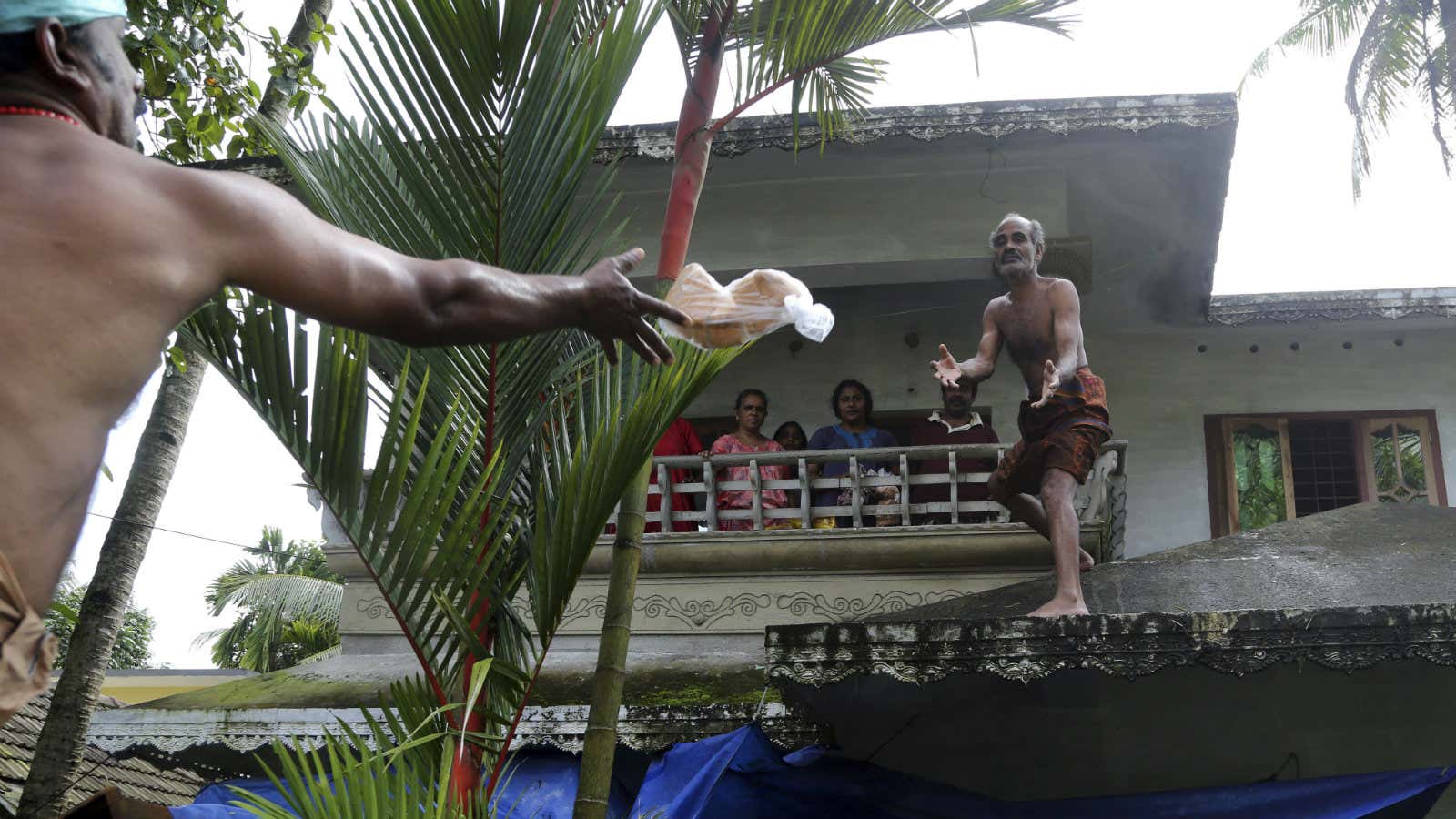Usually, around this time of the year, Malayalis, the speakers of the Malayalam language across the world, are preparing to welcome Maaveli. Ever since his exile to the netherworld once upon a time by jealous gods, this mythical king is allowed to visit his subjects, the natives of the coastal Indian state of Kerala, once a year.
So the welcome party for Maaveli, colloquialism for Mahabali (the immensely powerful), begins 10 days ahead and culminates on the day of Thiruvonam, Kerala’s most important festival, which falls on Aug. 27 this year.
However, it is different this time—Maaveli, loved for his strong, just, and generous reign, has chosen to advance his visit. Because his people needed him.
After all, over 200 residents of Kerala have died over the past two weeks in apocalyptic floods and landslides. Over a million have been rendered homeless and moved to 3,200-odd disaster relief camps. Every single district of the state has been hit by the worst flooding of nearly a century.
So Maaveli didn’t wait for Thiruvonam.
Popularly imagined as a caricature—rotund, with a thick handlebar moustache—he took various other forms this time. Everywhere you looked in Kerala, you found him among the crowd, silently and diligently at work to restore the grace and gait of his people.
On Aug. 17, he was commodore Vijay Verma of the Indian Navy’s 321 flight squadron. Verma flew in to rescue a marooned pregnant woman in labour. His mates reeled her up as he held his chopper steady for over 30 minutes and took the expectant mother to the naval hospital in Kochi where she gave birth to a baby boy.
Maaveli Verma won’t be forgotten by the newborn and his mom anytime soon.
The monarch didn’t always need a chopper, though. In one of the worst-hit areas of south-central Kerala, Maaveli Rejichayan was seen rowing a makeshift reed-boat every day around his neighbourhood since the waters began to rise in the second week of August. His self-assigned task was to supply essentials like bottles of water and packets of milk to the marooned.
There were indications that Maaveli had arrived right at the beginning when the situation took a turn for the worse early this month. On Aug. 10, the sluice gates of the Idukki dam were opened and the gushing waters were expected to enter Cheruthoni village in southern Kerala. Minutes before the deluge inundated a small but key bridge there, a man and his little son—burning with fever—turned up at one end, looking to reach a hospital on the other. Maaveli Kanhaiya Kumar, a constable with India’s National Disaster Response Force, didn’t think twice before hauling the child up and simply racing across the quickly submerging bridge.
Unbeknownst to Malayalis, their king was guarding Kerala’s long coast, regularly practicing his skills against the sea. And when the time came, he got into battle mode and turned inland. Indeed, it was his boat, and those of thousands of his fisherman colleagues, that rescued hundreds of thousands of stranded people. A few days ago, Maaveli Jaisal KP was seen on all fours in the floodwater as women stepped on his back to get on a boat in Malappuram district. And to think that he and his people were still recovering from the 2017 Cyclone Okchi that killed around 80 of his brethren and destroyed many of their villages and boats.
And all these were just recorded instances of Maaveli’s heroism. The king’s spirit evidently resides in the millions of volunteers and laymen who stepped up to save the day, cooperating with and assisting authorities in rescue and relief. Be it the young collegian Hanan Hamid, who earns a living selling fish and donated Rs1.5 lakh towards disaster relief, or the hundreds diligently and systematically collecting and channelising relief received from across the world.
Perhaps, most importantly, it is the survivors who embody their king’s spirit. Crushed they may be, but they are already looking ahead. To rise soon again and say, “Happy Onam.”
(The above is a video from a relief camp at the Baselios Vidyaniketan School, Cheranalloor, Kerala )
We welcome your comments at ideas.india@qz.com.
